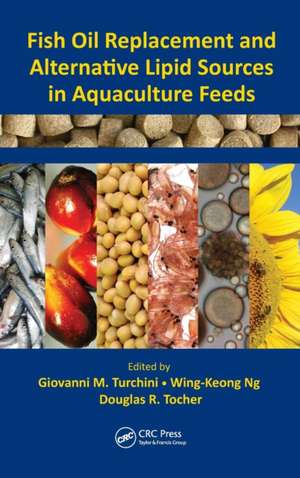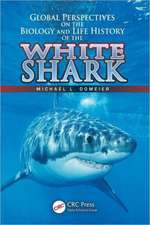Fish Oil Replacement and Alternative Lipid Sources in Aquaculture Feeds
Editat de Giovanni M. Turchini, Wing-Keong Ng, Douglas Redford Tocheren Limba Engleză Hardback – 19 iul 2010
The First & Only Book Specifically Addressing this Issue
With contributions from more than 30 international experts, the book provides a global perspective on the production, rationale, and use of fish oils, vegetable oils, and animal fats in relation to the aquaculture and aquafeed industries. After a detailed discussion on alternative lipid sources, the book discusses groundbreaking research on the use of these lipid sources as fish oil substitutes, as well as their potential advantages and challenges for use in aquafeeds.
Written by Leading Scientists & Industry Authorities
Rounding out its solid coverage, the book then explores the important physiological effects of various lipid sources and their components on growth, lipid metabolism, health, and postharvest qualities of the farmed fish. Both timely and pertinent, Fish Oil Replacement and Alternative Lipid Sources in Aquaculture Feeds is the most authoritative and comprehensive review on the substitution of fish oil in aquaculture feeds addressing the issues, science, and future directions of using sustainable alternatives.
Preț: 1342.79 lei
Preț vechi: 1637.55 lei
-18% Nou
Puncte Express: 2014
Preț estimativ în valută:
257.02€ • 279.28$ • 216.04£
257.02€ • 279.28$ • 216.04£
Carte tipărită la comandă
Livrare economică 21 aprilie-05 mai
Preluare comenzi: 021 569.72.76
Specificații
ISBN-13: 9781439808627
ISBN-10: 1439808627
Pagini: 552
Ilustrații: 56 b/w images and 73 tables
Dimensiuni: 156 x 234 x 36 mm
Greutate: 0.91 kg
Ediția:1
Editura: CRC Press
Colecția CRC Press
ISBN-10: 1439808627
Pagini: 552
Ilustrații: 56 b/w images and 73 tables
Dimensiuni: 156 x 234 x 36 mm
Greutate: 0.91 kg
Ediția:1
Editura: CRC Press
Colecția CRC Press
Public țintă
Aquaculture researchers and managers, fishery biologists, oil chemists, animal nutritionists, and food chemists.Cuprins
Fish Oils in Aquaculture: In Retrospect. Lipids in Aquafeeds. The World’s Oils and Fats. Palm Oil and Saturated Fatty Acid–Rich Vegetable Oils. Soybean Oil and Other n-6 Polyunsaturated Fatty Acid–Rich Vegetable Oils. Rapeseed (Canola) Oil and Other Monounsaturated Fatty Acid–Rich Vegetable Oils. n-3 Polyunsaturated Fatty Acid–Rich Vegetable Oils and Blends. Terrestrial Animal Fats. Alternative Marine Resources. New Alternative n-3 Long-Chain Polyunsaturated Fatty Acid–Rich Oil Sources. Minor Components in Fish Oil and Alternative Oils with Potential Physiological Effect. Fish Oil Replacement in Starter, Grow-Out, and Finishing Feeds for Farmed Aquatic Animals. The Effects of Fish Oil Replacement on Lipid Metabolism of Fish. Welfare and Health of Fish Fed Vegetable Oils as Alternative Lipid Sources to Fish Oil. The Effects of Fish Oil Replacement on Nutritional and Organoleptic Qualities of Farmed Fish.
Notă biografică
Dr. Giovanni M. Turchini has a master’s degree in animal science and a doctorate in food quality and fish nutrition from the University of Milan, Italy. After a postdoctoral fellowship at the University of Milan, he moved to the School of Ecology and Environment at Deakin University, Australia. While in Australia, Dr. Turchini has been awarded the prestigious Australian Postdoctoral Discovery Fellowship and the Australian Research Fellowship, both from the Australian Research Council (ARC), for his research on fatty acid nutrition and metabolism in farmed fish. Currently, he is an ARC Fellow affiliated with the School of Life and Environmental Sciences, Deakin University. His research interests span from fish oil replacement and fatty acid metabolism in cultured aquatic species to fatty acid–hormone interactions, seafood quality and traceability, and ethical issues encountered in the fisheries and aquaculture sectors. Dr. Turchini has published extensively in the area of aquaculture nutrition and fish quality.
Wing-Keong Ng received his bachelor of science degree in aquatic biology from Universiti Sains Malaysia. He then obtained his master’s degree in aquaculture from the Asian Institute of Technology (Thailand), and doctorate in nutrition at the University of California, Davis (USA). After a postdoctoral fellowship at Mississippi State University (USA), he returned to Malaysia. He has been a visiting scientist to the University of Stirling (Scotland, UK) and the University of Tasmania and CSIRO (Australia) under the Commonwealth and Endeavor Fellowships, respectively. Dr. Ng is currently a professor affiliated with Universiti Sains Malaysia, where he started the Fish Nutrition Laboratory and leads a research program aimed at developing a better understanding of nutrient utilization by fish and shrimp. He has focused interests in the evaluation of novel protein and lipid sources in aquafeeds to improve the economic and environmental sustainability of aquaculture operations. Professor Ng has published extensively in the area of aquaculture nutrition and is on the editorial board of several international and regional journals. He is a consultant to various international aquaculture organizations and aquafeed-related companies.
Douglas R. Tocher has a bachelor of science degree and a PhD in biochemistry from the University of Edinburgh, Scotland. He worked for 16 years for the UK Natural Environment Research Council (NERC) at the Institute of Marine Biochemistry, Aberdeen and the Unit of Aquatic Biochemistry, University of Stirling. His main research interests during this period were fish lipid and fatty acid metabolism, including embryonic and early larval development, and cell culture studies on eicosanoid metabolism, polyunsaturated fatty acid synthesis, and neural development. He later joined the Nutrition Group at the Institute of Aquaculture, University of Stirling, where he is currently professor of molecular nutrition. His primary research interests are currently focused on the molecular biology and genetic basis of regulation of lipid and fatty acid metabolism in fish. Professor Tocher has coauthored more than 260 scientific publications. He is a member of the European Federation for the Science and Technology of Lipids (EuroFed), American Oil Chemists Society (AOCS), and European Aquaculture Society (EAS). He is on the editorial board of several international journals.
Wing-Keong Ng received his bachelor of science degree in aquatic biology from Universiti Sains Malaysia. He then obtained his master’s degree in aquaculture from the Asian Institute of Technology (Thailand), and doctorate in nutrition at the University of California, Davis (USA). After a postdoctoral fellowship at Mississippi State University (USA), he returned to Malaysia. He has been a visiting scientist to the University of Stirling (Scotland, UK) and the University of Tasmania and CSIRO (Australia) under the Commonwealth and Endeavor Fellowships, respectively. Dr. Ng is currently a professor affiliated with Universiti Sains Malaysia, where he started the Fish Nutrition Laboratory and leads a research program aimed at developing a better understanding of nutrient utilization by fish and shrimp. He has focused interests in the evaluation of novel protein and lipid sources in aquafeeds to improve the economic and environmental sustainability of aquaculture operations. Professor Ng has published extensively in the area of aquaculture nutrition and is on the editorial board of several international and regional journals. He is a consultant to various international aquaculture organizations and aquafeed-related companies.
Douglas R. Tocher has a bachelor of science degree and a PhD in biochemistry from the University of Edinburgh, Scotland. He worked for 16 years for the UK Natural Environment Research Council (NERC) at the Institute of Marine Biochemistry, Aberdeen and the Unit of Aquatic Biochemistry, University of Stirling. His main research interests during this period were fish lipid and fatty acid metabolism, including embryonic and early larval development, and cell culture studies on eicosanoid metabolism, polyunsaturated fatty acid synthesis, and neural development. He later joined the Nutrition Group at the Institute of Aquaculture, University of Stirling, where he is currently professor of molecular nutrition. His primary research interests are currently focused on the molecular biology and genetic basis of regulation of lipid and fatty acid metabolism in fish. Professor Tocher has coauthored more than 260 scientific publications. He is a member of the European Federation for the Science and Technology of Lipids (EuroFed), American Oil Chemists Society (AOCS), and European Aquaculture Society (EAS). He is on the editorial board of several international journals.
Recenzii
Within the space of just over 500 pages ... this book provides a comprehensive overview on the production and use of fish oils, vegetable oils, terrestrial animal fats, and several unconventional lipid sources in finfish aquaculture and the aquafeed industry. All chapters are tightly packed with factual information, and all are also extensively referenced, with quite a strong emphasis on recently published review articles, original papers, and reports. ... The overall structure of the book has been well thought out, and the chapters follow in a logical sequence, making it relatively easy for the reader to find a clear path to follow. ... Fish Oil Replacement and Alternative Lipid Sources in Aquaculture Feeds is a most useful compilation ... . The book presents key, up-to-date information about the importance of lipid nutrition in finfish aquaculture, and about the availability and use of oil sources in the production of aquafeeds. Its main advantage is that the information is collected in a single volume, so the book is likely to become a standard source of reference for fish nutritionists and other aquaculture professionals.
—Malcolm Jobling, University of Tromsø, Norway, in Springerlink.com, August 2010
—Malcolm Jobling, University of Tromsø, Norway, in Springerlink.com, August 2010
Descriere
After decades of unsustainable fishing practices, there is now great urgency within aquaculture to find and implement sustainable alternatives to fish meal and fish oil and to transform aquaculture into an environmentally friendly and economically viable means of increasing the global supply of fish and seafood. This book is the first comprehensive review on the multifaceted, complex issues relative to increasing global demand for fish products, as well as fish oil shortages and fish oil substitution in the formulation and production of feed for farmed aquatic species.







